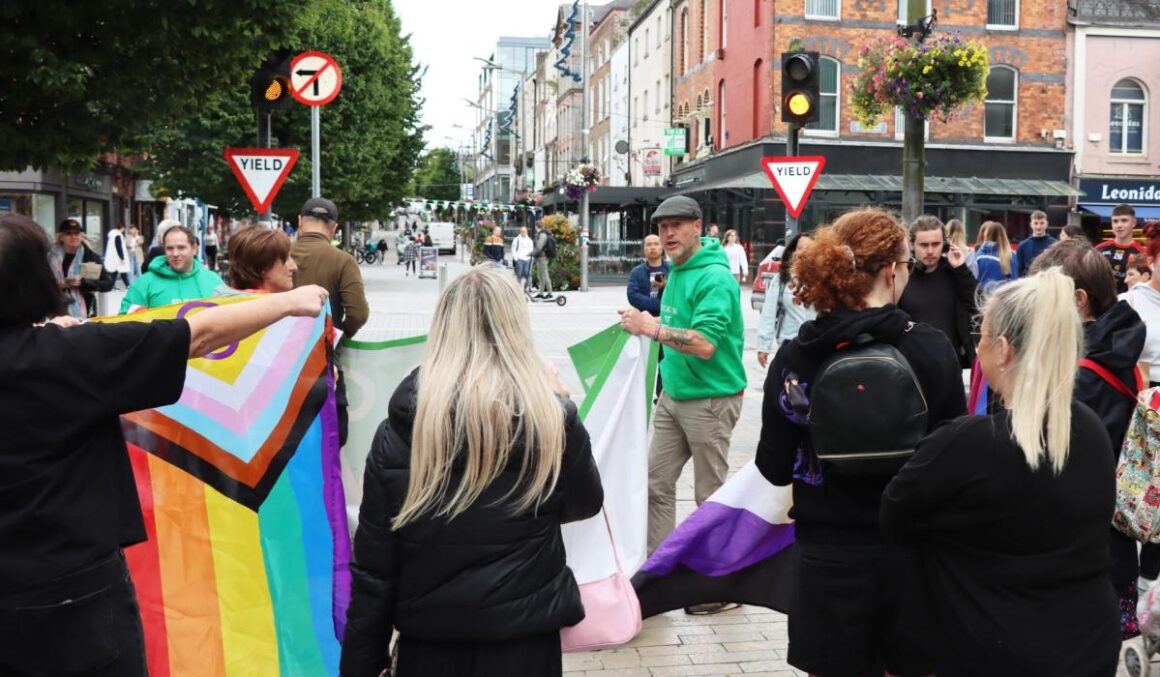2023 will be remembered as the year bigots began lashing out at public libraries. There was a long-running campaign of harassment and threats in Cork City, along with incidents in other places. In August, a small group drove a rickety boat up the Shannon, targeting libraries as they went – a sad incoherent Viking fantasy, with selfie sticks instead of axes. They ran into libraries hooting, jeering and jostling. They grabbed and head-locked women. They chased a man down and beat him up. In October, Athlone, Galway and Limerick libraries were targeted.
The events of this year are a warning to library staff and trade unionists. These are small groups of cranks targeting books for young trans and LGBTQ+ people. But in the United States we are seeing the banning of books and an onslaught of homophobic and transphobic laws. In some places, for example, a teacher can no longer be openly gay. If they are not opposed, the far right will get what they want here in Ireland as well.
This article was co-written by library workers and Fórsa members. Its aim is to make a case for actively resisting these attacks, and to lay out some practical things we can do to protect ourselves, our co-workers and our society.
The case for resisting the far right
Some question the purpose of resisting the far right. Why give them the attention and drama they crave? Shouldn’t we just keep our heads down until this nonsense blows over?
It is true that these groups love provoking aggro for their cameras. But there are types of confrontation they do not want: ones where they are outnumbered or blocked – where their lack of popular support is obvious.
These agitators are usually people with bizarre and very unpopular ideas. But they do not intend to convince us by patient argument. It’s more in their line to gain ground by projecting strength and by occupying public space. When they succeed, they embolden their supporters and push the politicians to the right.
The latest round of attacks in October shows that we can’t simply hope for things to blow over. It’s not an accident or an episode, but part of the growth of far-right forces in Ireland. It’s the price we are paying for austerity, for the housing crisis, for the inequalities laid bare by Covid. Into this tense and confused situation, ultra-conservative forces have pushed narratives that scapegoat refugees and trans people. The far right gain ground because of the lack of a strong trade union movement or socialist politics to provide a better explanation. This is going to get worse before it gets better, and we need to do something about it.
Impact on library workers
We should consider the toll this can take on each of us personally. Most librarians are women, and some are LGBTQ+ people or people of colour. It is obviously worse if you are any of the above, but no matter who you are, it takes a toll when you have to come face to face with violent, bigoted, abusive individuals. In the wake of far-right harassment in October, cranks have rung up library workers threatening to report them for child abuse. At the very least, this causes real misery and stress. But it’s easy to imagine far worse consequences.
As a union, let’s regard these attacks as a safety and wellbeing issue, more serious than any other we are facing, and respond as such.
Impact on society
‘Her name is Alice, and she’s a beautiful person and she’s my first cousin.’ – A member of the public on Church Street, Athlone, confronting anti-trans agitators in August 2023
Our safety and dignity at work are crucial, but this issue is even bigger. We need to look at the toll this can take on our society.
Librarians are defending young people’s right to basic sex education – including for queer, trans and non-binary youth. The idea that these books are ‘pornography’ is ridiculous. It also ignores the real point: that the alternative is to let young people get their sex education from literal porn.
In 2015 and 2018 landslide votes favoured marriage equality and abortion rights in Ireland. But if these attacks are allowed to continue unchallenged, progress could be thrown into reverse. We could face a situation where harassment of library workers by cranks is normalised; or where bigoted abuse becomes more common; or where businesses and institutions are afraid to show public support for LGBTQ+ people. This is not scaremongering – it’s already happening. Polls in the United States generally show a progressive majority, but its toxic political culture has produced attacks (political and literal) on libraries, schools and LGBTQ+ people. Over there, the far right are showing up with assault rifles to menace drag queens and children.
We didn’t ask for this, but like it or not, we are now holding the line against people who want to drag us back into times of bigotry and ignorance that we thought we had left behind.
Resistance
“NOT TODAY LADS’ Limerick tells the far right – Headline from the Limerick Post, 12 August 2023
The good news is that the forces opposed to the far right are far stronger right now. Resistance is possible and we have already seen it in many places. The example of Limerick shows what can be done.
An anti-racist network had been established in Limerick with a conscious orientation towards mobilising communities against attempts at racist division. The initiative was prompted after witnessing far-right political forces elsewhere sowing division around issues like housing, health crisis, and gendered violence. The intent was to build a network in workplaces, colleges and communities to proactively combat far right narratives which would undermine united campaigns on these issues.
The so-called ‘Sovereign Voyage’ set out from Limerick in August, meaning that this network had time to plan a response. There was determination that the scenes from elsewhere would not be tolerated in Limerick.
Activists went to workplaces potentially threatened by the library invaders to warn workers and offer cooperation and solidarity. Therefore the response of the network was pursued in collaboration with workers, but there is no reason why this could not be directly initiated elsewhere by the workers affected.
When the far right landed in Limerick and attempted to distribute their hate literature and hang their banner in the street, a wide cross-section of the city’s working class mobilised to confront them – captured in the viral video of the young woman who bravely challenged one far-right participant’s disgusting record of gender violence ,and an older man who appeared on the library invaders’ own live stream determinedly challenging this group’s reactionary and hateful homophobic record.
The result of this was that the group had to pack up and leave their street activity early. They then took a circuitous route to the city library, presumably to avoid being followed, but were surprised to be met by an organised blockade at the entrance of the library. The Gardaí were in attendance and, as the far-right group approached, the people at the entrance linked arms. This was as much as a message to the Gardaí as it was to the far right, the scenes of Gardaí escorting the invaders into Swords library was not going to be allowed to be repeated.
Since then, this group of far right agitators have appeared unannounced in Limerick three more times. But each time the network has spotted them and been able to organise a response, including confronting them in the library space and expelling them. Essentially this group are being harried every time they set foot in Limerick, due to the confidence the organised response engendered in the wider public. The network has taken on the character of a mutual defence group and has grown exponentially in the wake of the August attack on the library.
Workers are entitled to defend themselves from intimidation, threats, and violence. But it isn’t best pursued individually, instead it is better to organise others affected to confront the threat as a mass acting in solidarity. This is the lesson from the experience in Limerick.
The ‘Sovereign Voyage,’ after much hype, was deterred from even trying to enter Athlone library by the presence of local activists. Earlier in the year in Cork, hundreds marched against the far right. Along with library workers, there were other council staff, young people and LGBTQ+ people. These and many other events show the willingness of local people to stand with library workers.
The State and the establishment
Compare this to the response of the Garda Síochána. In some areas they did not turn up even after physical assaults were reported to them. When they did show up eventually they took a ‘both sides’ approach. Earlier in Swords the Gardaí came in for widespread criticism for escorting the far-right group into the library, a move condemned in the Fingal Council chamber by Solidarity-PBP councillor John Burtchael.
Many librarians would know that the reality for trans people in general is bleak and difficult – they face abuse, violence, homelessness and unemployment, and wait years for urgent healthcare. This is the exact opposite to the way the bigots frame the situation. The far right are not revolutionaries; they simply want a more extreme version of the way things are. They do the establishment a massive favour by portraying them as defenders of trans people, refugees, etc. Nothing could be further from the truth.
This is why we are not calling for ‘tougher policing.’ Library management, councils or Gardaí may have useful contributions which we can assess on their merits, but in general a rebuke to the far right needs to come from the people themselves, first and foremost from library workers.
How to resist
The range of possible scenarios means we should consider a range of responses. These are suggestions, to open up a discussion. Under the pressure of a real confrontation, things can be unpredictable and challenging.
- Personal security
Library workers know the drill now about saying you don’t consent when someone waves a phone camera in your face. Hanging signs to that effect at the desk is also a good idea. ID badges should be put away to avoid being doxxed. In some libraries, workers have found ways to disrupt the live streams – for example by making a loud noise with a desk phone.
If librarians feel physically threatened, especially if alone, nobody can fault them for walking out. But closing the library in response to aggression is not the best outcome, as this means the bigots are getting what they want. This happened in Cork during the incident with the banner.
- Walkouts
It is a different story if library workers themselves organise a walkout or protest. This too happened in Cork, with staff and the wider public joining together in a march hundreds-strong – far bigger than the little groups of cranks who were attacking the library.
- Trade Union response
Our union responded to these threats with some good initiatives. Fórsa gathered intel on what was going on. Our officials were the first to advise us on what to do. They got council managements to take various useful measures.
But we could do much more. Fórsa has 80,000 members. If we know that the far right are coming to X library on Y date, the union should put out an appeal to its members to be there to respond, and should actively mobilise. If incidents happen before there is time to respond, Fórsa could, after the event, organise walkouts, protests, public meetings, etc, as was done in Cork – though in that case all libraries in Cork City should have been mobilised, not just one.
The union is really crucial. These far-right groups threaten our safety and dignity at work. Our union defends us in relation to our employer, and it must defend us in relation to these groups as well. When necessary, we take industrial action against our employer. It is necessary now that we take action in our workplace to stop these bigots.
- The public
The primary responsibility lies with our union to protect us at work, but our local communities have played an inspiring role this year.
Library staff might be wary of having large numbers of people showing up to a tense situation. What is key is that there are stewards and that participants are coached on tactics. Members of the public will show up anyway – better they do it in an organised way. Library workers should stay in touch with supportive members of the public.
- Management and staff
We should consider the danger that the authorities give in to pressure and withdraw these books, or, for example, prevent us from holding Pride Month events.
We need to be ready to intervene as a union and say that, on the library floor, our members will not cooperate with such a course of action.
- What kind of counter-actions do we need?
Resistance can even take the form of simple acts. Library workers could produce a bookmark with writing on it, outlining the situation and advising the public on what to do if the library is targeted while they are in it. This bookmark could be put into every item we issue to adults and YAs. With actions along these lines, we ourselves would take control of the defence of libraries.
Nobody wants to see their own face in the live stream of some fascist hooligan. But if your face is just one of dozens or hundreds in an impressive counter-action, that’s a far better situation.
Get in touch!
This article was written by a group of library workers and Fórsa members. We want to hear from you. What is the situation in your workplace or library service? What do you and your co-workers think? Whether you are a library worker or a concerned member of the public, we invite you to discuss further how best we can defend our libraries.
Get in contact with us by sending an email John at Libraries-Resist@googlegroups.com, or use this link or QR code to leave your details or share your thoughts.













